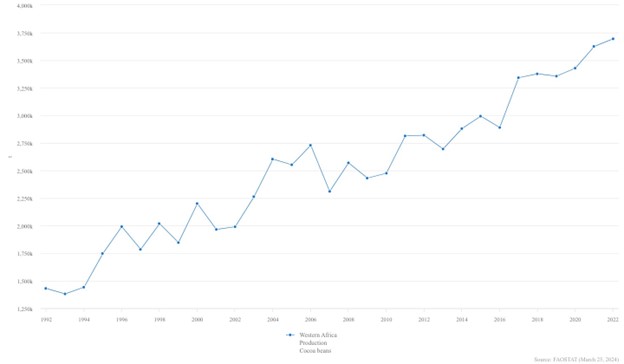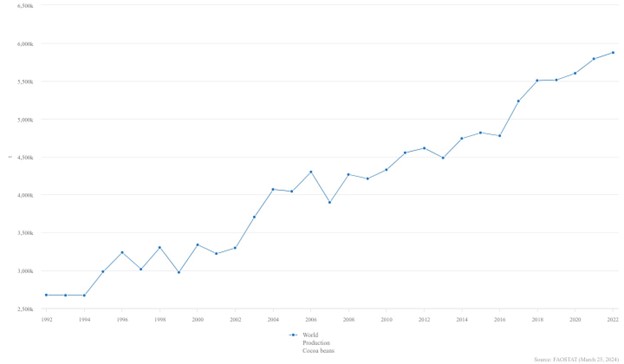Wrong, Daily Mail, Climate Change Isn’t Causing a Chocolate Easter Egg Crisis
The Daily Mail posted an alarming Easter themed story saying climate change has caused the price of chocolate Easter eggs to increase. This is false. Chocolate Easter eggs and other chocolate candies have seen prices increase; however, data prove it isn’t due to a shortage of cocoa beans since cocoa production has risen as the Earth has warmed. If climate change isn’t harming cocoa production, it can’t be behind the rising prices.
“With Easter fast approaching, you might have already begun to notice that Easter eggs are more expensive this year,” opens the Daily Mail’s article, titled Chocolate Easter eggs have risen in price by 50% or more in the UK – and scientists say climate change is to blame. “But this isn’t just due to inflation, as scientists say climate change is a key reason your chocolate is costing more.”
“According to researchers from the Energy and Climate Intelligence Unit (ECIU), a combination of wet heatwaves and drought have battered this year’s cocoa harvest,” writes the Daily Mail.
The ECIU’s claim is false on a number of counts. First, across the region making up West Africa, it is common, not rare, for it to have heatwaves and heavy rains, interspersed with periods of drought. Those conditions are known as typical weather there. Hot weather is the norm across West Africa. While the northern part of West Africa is semi-arid Sahel, a transition from the Sahara to the savannah grasslands, much of the region is tropical forests where rainfall is common and commonly heavy. So, a “wet heatwave” is not uncommon and cocoa production, in fact, requires and thrives in hot wet conditions, which is why most global cocoa production comes jungles and forests near the equator, where much of West Africa lies.
The rains are interspersed with periods of intense drought, especially in the arid northern part of West Africa. As the U.S. National Science Foundation wrote recently, “West African droughts are the norm, not an anomaly … some droughts lasted centuries in the past ….” So a single year’s drought after heavy rain is not proof or even an indication of climate change. Indeed, history indicates that West Africa cycles periodically from wet periods to dry periods lasting multiple decades each. Multiple studies, here, here, and here, for example, confirm the region’s climate history. Since 1991, the Sahel region in West Africa has been in a rainy period recovering from an extended dry period from the early 1970s to the 1990s. As has been pointed out repeatedly at Climate Realism, here and here, for example, scientific bodies recognize climate change as indicated by a shift in average weather recorded over a 30-year period, not the weather happening in a single year or couple of years. There is no trend for either drought or extreme rainfall which would indicate climate change is impacting normal rainfall patterns in West Africa, rather recent weather has been well within the historic cyclical norms for the region.
While weather hasn’t changed much in West Africa’s cocoa production region, cocoa production has, increasing dramatically even has the weather has varied from year to year. Like most other crops, cocoa production has grown substantially during the recent period of climate change in response, in part, to increased atmospheric carbon dioxide. During the period when climate alarmists claim warming has been most severe, data from the U.N. Food and Agriculture Organization show that between 1992 to 2022 (the latter being the most recent year for which data is available): Cocoa bean production in West Africa increased by more than 158 percent. West Africa set records for production 17 times during that period, most recently in 2022. (see the figure, below)

Globally the story is much the same. Global cocoa bean production from 1992 to 2022 grew by nearly 120 percent, setting records for production 19 times, with each of the last six years setting new records for production. (see the figure, below)

Because the climate in West Africa isn’t changing and cocoa production is setting records, one can hardly blame climate change for the higher costs of chocolate Easter eggs in the United Kingdom or anywhere else.
Interestingly, in its story the Daily Mail pointed to two other more likely candidates for the price increase: El Niño and inflation. Sadly, the Daily Mail promptly downplayed these two tangible factors to play up the false climate change angle.
The past two years wide weather swings across the globe have been dominated by the shift from a La Niña to a “strong El Niño year,” as the Daily Mail admits.
Then there is the dramatic increase in inflation affecting most of the world, complicated by supply chain issues. It should be noted that inflation is being driven, in part, by developed countries’ climate policies that have raised the costs of fossil fuel production and use which has contributed to higher costs for the energy used to process and the fuels used to transport cocoa and finished chocolate products.
To conclude, there is no evidence climate change has played any role in the U.K.’s chocolate Easter egg crisis. Rather than publishing one more “climate change is causing everything bad” fairy tale, the Daily Mail, would better serve their readers by checking the facts and publishing them. Doing so would reduce its readers’ climate anxiety and in the process direct their attention to a more likely cause of higher chocolate prices: government climate policies which increase energy costs.

